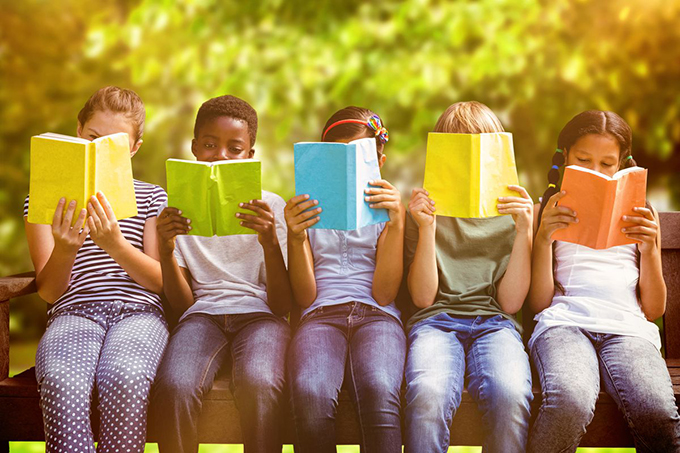
Why not take advantage of the summer season of change of scenery, to encourage your children to reconnect with the world of books, or simply to diversify their reading? Between novels, novels and poems, fantastic journeys, family sagas or humorous questions from today’s world, here are seven tracks to explore with an audience of 5 to 15 years old.
Not so bad
With Not so bad (Ker Jeunesse editions, 2015), Marie-Aude Murail gives us a collection of three short stories to enjoy. A perfect format for evening stories, for oral reading with children aged 5, or for independent reading from 7 years old. And a very good entry into the humorous and offbeat world of this must-have author of youth literature.
This news is filled with word games (with eg the ogres Boufpatan, Boufpatou and Boufpatro or rabbit Tibou Nulantou), funny stories, but also moments of reflection: the ogres must they be mean? What would happen if children could decide instead of adults? Or how do we know if our parents love us?
Bob the anteater
Jérôme Pace , Doctor of Religious Studies, has been working for several years in the press and publishing circles; he directs the collection Lettres japonaises at L’Harmattan. Passionate about French language and writing, he published in 2010 this collection of poems in verse and prose, where rare words have the share.
Each of Bob’s nine poems , funny words, funny stories (L’Harmattan, 2010) features animals or wonderful creatures whose adventures are narrated in an abducted style, where the pleasure of language is obvious and contagious .
The back cover invites children to discover unknown words: a rich but clear index allows everyone to continue reading without difficulty, and to enrich their vocabulary. It is an introduction to the joys of language offered by the author: those forgotten words, sounds, rhythm, and the transmission of stories.
Perfect children
From a radio creation broadcast in 2010, published in 2019 by Thierry Magnier, this small book of forty pages questions children about the place of humanoid robots in our society.
The story of Mariannick Bellot begins when Barnabé acquires a robot to replace him at school. Very quickly, it takes a darker turn when the robot tries to take his place of the hero in his family. Easy to read from the age of seven, this book will allow children to ask philosophical questions about what constitutes their humanity.
stunning
The world of Léa, the heroine of this little novel, is a world where women have the power: they are presidents, ministers, writers, professors, magistrates, poets etc. These are the men who take half-time to take care of the children and the house and that “since the dawn of time”!
In this reversed world it is the feminine that prevails over the masculine in the grammar books and the book itself plays metatextually on this rule by feminizing all the names and giving everything to the feminine.
Florence Hinckel humorously plays on clichés and stereotypes of genres to better demonstrate their constructed character – and therefore “deconstructible”. Reversing (The School of Recreation, 2019) is a book for children but also for adults and can be read independently from nine years.
The Pearl Book
For teen readers, Timothée de Fombelle offers a beautiful book that combines two worlds, ours and that of fairy tales, with several narrators that allow the reader to travel between universes and eras.
From the timeless magical world to our society, from the 1930s to the 1980s, stories intertwine and intertwine, recounting the love story between a fairy and a prince, who find themselves exiled into our own world. Winner of the nugget prize of the European teen romance of 2014, written with delicacy, The Book of Pearl (Editions Gallimard Jeunesse, 2014) will enchant the readers keen on adventure, twists and magic.
Dawn will be great
Nine, a fifteen-year-old girl, is brought by her mother one evening to a cabin by a lake. Throughout the night his mother will tell him his own story, the story of an incredible family saga, touching, funny and sad.
This two-voice narrative, Nine’s and her mother’s, is punctuated by the hours of the night and the tension that grows over the reading and narrative that weaves. With Dawn will be great (Gallimard Jeunesse, 2017) Anne-Laure Bondoux , laureate of the Friday prize , presents a poetic story that keeps the reader in suspense until the last page.
The Beautiful Wild
Philip Pullman’s latest publication , La Belle Sauvage is the first volume of a trilogy yet to come, extending its famous trilogy for youth at the crossroads of worlds . New readers will find a clear introduction to his world, and the initiates a rich depth. From the inn run by his parents, the young Malcolm witnesses the rise of authoritarianism and finds himself drawn into political machinations that will take him to the heart of the turmoil.
La Belle Sauvage (Gallimard Jeunesse, 2017) is a travelogue that mixes fantasy, spy novels and fairy tales. The boat of the same name Malcolm makes him cross the Thames, through cities, social strata, literary genres and worlds. A true introduction to reading, this novel articulates political issues and phantasmagorical encounters, and enjoins everyone to learn more and use their knowledge to change the world.
Author Bios: Eléonore Cartellier is a Doctor in British Literature and Sibylle Doucet is a PhD student both at Grenoble Alpes University
